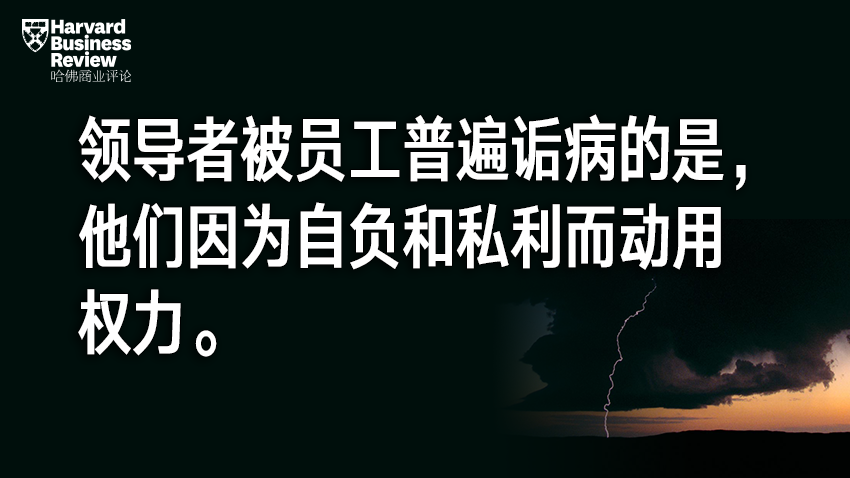Personal power actually affects our ability to resonate with others.
Editor’s note: This article comes from the WeChat public account “Harvard Business Review” (ID: hbrchinese), author HBR -China.
A senior executive named Steve worked with me. He received feedback from his boss that his work style after he was promoted was annoying. The boss said that unconsciously, as long as he attended the meeting, the atmosphere would be suffocating. Steve just announced the correct answer. No one wanted to give his own ideas and feedback. Since Steve was promoted, he is no longer a member of the team, but has become a superior leader, feeling that he is better than others. In short, he has lost his ability to empathize.
Why do many people change their behavior once they enter management? Research shows that personal power actually affects our ability to resonate with others.
The empirical results of Dacher Keltner, a social psychologist and contributor at the University of California, Berkeley, show that people who hold power often lack empathy and cannot read other people’s emotions. And can’t make others accept their actions. In fact, according to research by Sukhvinder Obhi, a neuroscientist at Wilfried Laurier University in Ontario, Canada, power can change the way the brain works.
The most common failure of the leadership is not deception, embezzlement of public funds, or sex scandals. The most common criticism of employees is that leaders do not do well in their daily self-management—they use power because of ego and self-interest.
How did this happen? The fire of the stars gradually ignited the original. At first, they may unconsciously make a few bad choices. For example, they may unconsciously start gesticulating, demanding special treatment, and gradually develop into arbitrary decisions and do whatever they want. The leader who was pulled aside by the police for speeding or drunk driving became indignant and abused:”Do you know who I am? ! “Suddenly, social media have reported such incidents. The personal qualities of the leaders we once respected disappeared without a trace.
How do people start by pursuing their dreams but eventually embark on a path of exaggeration? They will encounter bottlenecks in the long road of climbing power. Once crossed, they no longer give power generously, but use power for private gains.
Take Patrick Cannon, the former mayor of Charlotte, North Carolina. Cannon had nothing at first. At the age of 5, he overcame the severe blow that his father died and endured poverty. He obtained a degree certificate from North Carolina A&M State University and entered the public utility at the age of 26-becoming the youngest MP in the history of Charlotte. As we all know, he wholeheartedly serves the people and becomes a role model for young people to learn.
But then, Cannon, 47, admitted to taking bribes of $50,000 while he was in office. In the federal court of the city, he stumbled and fell. The media captured the scene of his fall, and used it as a symbol of the decline of the elected leaders and small business owners who had chosen one after another and had outstanding personal achievements. Now, Cannon has the “honour” of the city’s first detained mayor in prison history.
Informed sources said that he was a good person, but he was too emotional, so that he was isolated within the scope of his decision and became vulnerable. A minister of the local government also defended him that Cannon should not be used to judge Cannon and his outstanding public service career. But now the public judges his standard only by his weaknesses-a dramatic shift from humble, generous image to corruption. Mentioning him, the only impression left in people’s minds is when he fell in the court.
If leaders worry that they cannot grasp the boundaries of abuse of power, what should they do? First, other people must be invited to enter the decision-making process. Leaders with high weights must be diverse, dare to express their own shortcomings, and be willing to accept feedback and criticism.
A good executive coach can help you find a state of empathy with others and make valuable decisions. However, the number of people invited must be diverse, and the problem must have weight. Don’t ask soft questions, like what do you think of me? Instead, ask some sharp questions, such as how do you think my focus and style affect my employees?
Preventive thinking training can start with a list of self-awareness improvements:
1. You have a friend, family and colleagues,Regardless of your title status, are you willing to help your strong network support network?
2. Do you have executive coaches, mentors or close friends?
3. What feedback do you get when you fail to do what you say?
4. Will you ask for privileges?
5. Behind the spotlight, are you still fulfilling a promise that is not meaningful and difficult to achieve?
6. Are you willing to invite others into the spotlight?
7. Are you alone in the decision-making process? Do the decisions you make reflect your true value?
8. Have you admitted your mistakes?
9. Are you the same person in the spotlight, workplace and at home?
10. Have you ever told yourself that people like you have the right to enjoy exceptions or apply different rules?
If a leader deserves our trust, they should stick to standards that have no room for negotiation. Different words and deeds or using power for personal gain will make us very disappointed and angry. We want extraordinary leadership, vision, and dedication. However, whether they can empathize with others, whether they are authentic and reliable, and whether they are generous and generous are the criteria for distinguishing general competent leadership from excellent leadership. Leaders with the strongest self-awareness can quickly identify signals of power abuse and then return to the right track in time.
Keywords: leadership self-management
Lou Solomon | Text
Lo Solomon is the CEO of the communications consulting firm Interact. She helps CEOs, business leaders, managers, entrepreneurs, and their teams from Fortune 500 companies increase authenticity, build connections, and win trust, and Establish prestige.
Yiyan Netizen Nuan Chen | Yi Zhouqiang|School


